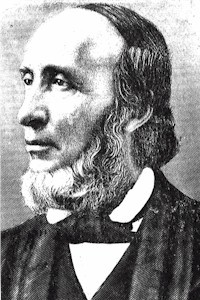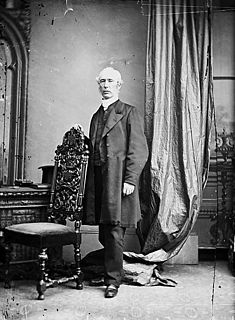Related Research Articles

Aberdare is a town in the Cynon Valley area of Rhondda Cynon Taf, Wales, at the confluence of the Rivers Dare (Dâr) and Cynon. Aberdare has a population of 39,550. Aberdare is 4 miles (6 km) south-west of Merthyr Tydfil, 20 miles (32 km) north-west of Cardiff and 22 miles (35 km) east-north-east of Swansea. During the 19th century it became a thriving industrial settlement, which was also notable for the vitality of its cultural life and as an important publishing centre.

Edward Everett Hale was an American author, historian, and Unitarian minister, best known for his writings such as "The Man Without a Country", published in Atlantic Monthly, in support of the Union during the Civil War. He was the grand-nephew of Nathan Hale, the American spy during the Revolutionary War.

Jared Sparks was an American historian, educator, and Unitarian minister. He served as President of Harvard College from 1849 to 1853.

Edmund Hamilton Sears was an American Unitarian parish minister and author who wrote a number of theological works influencing 19th-century liberal Protestants. Today, Sears is primarily known as the man who penned the words to "It Came Upon the Midnight Clear" in 1849. It has been sung to two tunes, one by Richard Storrs Willis and another adapted by Arthur Sullivan from a traditional English air.

Lewis Edwards was a Welsh educator and Nonconformist minister.

Evan Herber Evans, was a Welsh Nonconformist minister.
Henry Thomas Edwards was a Welsh preacher.

Trecynon is a village near Aberdare situated in the Cynon Valley, in Rhondda Cynon Taf, Wales. It dates from the early nineteenth century and developed as a result of the opening of the Aberdare Ironworks at Llwydcoed in 1800.

The Young People's Christian Union (YPCU), organized in 1889, was a Universalist youth group created to develop the spiritual life of young people and advance the work of the Universalist church. Soon after it was founded, the YPCU focused its attention on missionary work. It was instrumental in the founding of new southern churches and the creation of a Post Office Mission for the distribution of religious literature.

Joshua Toulmin of Taunton, England was a noted theologian and a serial Dissenting minister of Presbyterian (1761–1764), Baptist (1765–1803), and then Unitarian (1804–1815) congregations. Toulmin's sympathy for both the American (1775–1783) and French (1787–1799) revolutions led the Englishman to be associated with the United States and gained the prolific historian the reputation of a religious radical.
Unitarianism, as a Christian denominational family of churches, was first defined in Poland-Lithuania and Transylvania in the late 16th century. It was then further developed in England and America until the early 19th century, although theological ancestors are to be found as far back as the early days of Christianity. It matured and reached its classical form in the middle 19th century. Later historical development has been diverse in different countries.

The Cambrian Archaeological Association was founded in 1846 to examine, preserve and illustrate the ancient monuments and remains of the history, language, manners, customs, arts and industries of Wales and the Welsh Marches and to educate the public in such matters. The association's activities include sponsoring lectures, field visits, and study tours; as well as publishing its journal, Archaeologia Cambrensis, and monographs. It also provides grants to support research and publications.
Robert Aspland was an English Unitarian minister, editor and activist. To be distinguished from his son Robert Brook Aspland (1805-1869).

William Richards (1749–1818) was a Welsh Baptist minister; he spent much of his life in King's Lynn, in Norfolk, and wrote a history of the town. His other publications included a Welsh-English dictionary.
Josiah Rees was a Welsh Unitarian minister.

William Hincks was an Irish Unitarian minister, theologian and professor of natural history. He was the first professor of natural history at University College, Toronto and president of the Canadian Institute. He was also the first editor of the Unitarian magazine The Inquirer.

Hen-Dy-Cwrdd is a disused Unitarian chapel in Trecynon, Aberdare, Wales. Services at the chapel were conducted in the Welsh language.

The Unitarian Church in Ireland presently consists of two Congregations, Dublin and Cork, part of the Synod of Munster, in the Republic of Ireland, which has itself been part the Non-Subscribing Presbyterian Church of Ireland since 1935. Some congregations remain closely associated with the General Assembly of Unitarian and Free Christian Churches. These churches would abide by the traditional Unitarian principles of Freedom, Reason and Tolerance.

Gellionnen Chapel is a Unitarian place of worship near Pontardawe, South Wales, United Kingdom. The chapel was first built in 1692 by Protestant dissenters, becoming Unitarian in the late 18th century. It is a member of the General Assembly of Unitarian and Free Christian Churches, the umbrella body for British Unitarians. Gellionnen Chapel is the oldest Dissenting chapel in the Swansea Valley, is one of the oldest surviving chapels in the region and is a Grade II* listed building.

Nottage General Baptist & Unitarian Chapel is a nonconformist chapel in Nottage, Bridgend, Wales. It is shared by General Baptists and Unitarians.
References
- ↑ A History of Unitarianism: In Transylvania, England, and America Earl Morse Wilbur - 1952 -" Their cause has for a century been much aided by their monthly journal, Yr Ymofynnydd (the Inquirer), published since 1847. The churches unite for missionary purposes in the South Wales Unitarian Association, succeeding a Society of Believers in the Divine Unity in South Wales dating from 1802, and in the South East Wales Unitarian Society (1890); and they are all constituent members along with the churches in Great Britain and Ireland in the General Assembly of Unitarian and ..."
- ↑ Transactions - Unitarian Historical Society, London - 1943 Page 119 It was revived through the efforts of Aberdare Unitarians in 1859 and this series lasted until 1865 under the same editor, J. E. Jones; but owing to his failing health was suspended. Its place was taken by " Yr Athraw " (The Teacher) from 1865 till 1867, edited by " Gwilym Maries " (the Rev. Wm. Thomas, M.A., Llandysul). The Ymofynnydd reappeared in January 1868, supported by most of the South Wales Unitarian Ministers, under the editorship of the Rev. D. L. Evans, a tutor at ...
- ↑ "They thought for themselves": a brief look at the story of ... D. Elwyn Davies - 1982 - Page 170 This argument appeared in many forms between Unitarians. One example is the controversy that was contended (on the pages of Tr Tmqfynnydd) between D. L. Evans (b. 1834), a Unitarian minister and a tutor at Carmarthen, and Owen Evans, minister of Cefncoed, the former maintaining that the authority in religious matters is to be found in human nature and the latter in the Bible.